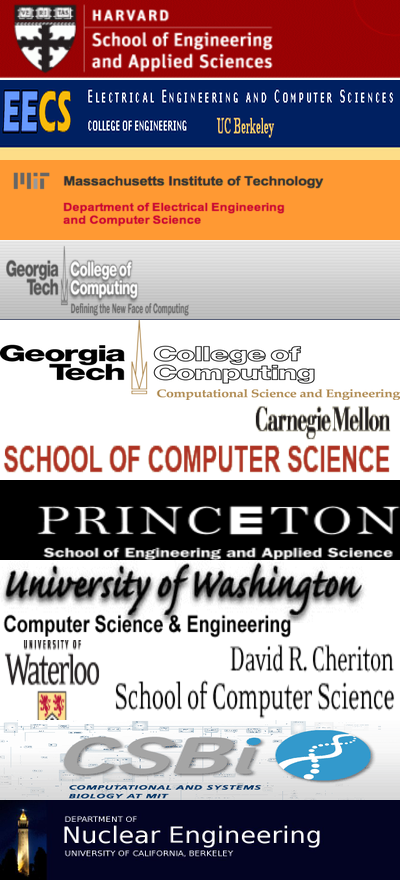Check out my first novel, midnight's simulacra!
Grad school: Difference between revisions
From dankwiki
No edit summary |
|||
| Line 2: | Line 2: | ||
==General notes== | ==General notes== | ||
* Dianne O'Leary's "[http://www.cs.umd.edu/~oleary/gradstudy Graduate Study in the Computer and Mathematical Sciences: A Survival Manual]" is pretty outstanding (aside from the God stuff, which you can take or leave (guess how I roll?)) | * Dianne O'Leary's "[http://www.cs.umd.edu/~oleary/gradstudy Graduate Study in the Computer and Mathematical Sciences: A Survival Manual]" is pretty outstanding (aside from the God stuff, which you can take or leave (guess how I roll?)). It's full of pithy gems like this:<pre>"It is possible to spend almost all of your time in literature review and seminars. It is easy to convince yourself that by doing this you are working hard and accomplishing something. The truth of the matter is that nothing will come of it unless your are an active reader and listener and unless you assign yourself time to develop your own ideas, too. It is impossible to "finish a literature review and then start research". New literature is always appearing, and as your depth and breadth increases, you will continually see new connections and related areas that must be studied.</pre>and:<pre>If you have a full or part-time job outside the university, you may feel that you are between two worlds, without belonging to either one. Neither the university nor the workplace is well adapted to dealing with the other, and each may place demands that are incompatible with those of the other. | ||
Your biggest problems may be the double commute, scheduling difficulties, and isolation.</pre> | |||
==PhD Applications== | ==PhD Applications== | ||
Revision as of 03:48, 15 October 2009

General notes
- Dianne O'Leary's "Graduate Study in the Computer and Mathematical Sciences: A Survival Manual" is pretty outstanding (aside from the God stuff, which you can take or leave (guess how I roll?)). It's full of pithy gems like this:
"It is possible to spend almost all of your time in literature review and seminars. It is easy to convince yourself that by doing this you are working hard and accomplishing something. The truth of the matter is that nothing will come of it unless your are an active reader and listener and unless you assign yourself time to develop your own ideas, too. It is impossible to "finish a literature review and then start research". New literature is always appearing, and as your depth and breadth increases, you will continually see new connections and related areas that must be studied.
and:If you have a full or part-time job outside the university, you may feel that you are between two worlds, without belonging to either one. Neither the university nor the workplace is well adapted to dealing with the other, and each may place demands that are incompatible with those of the other.
Your biggest problems may be the double commute, scheduling difficulties, and isolation.
PhD Applications
- CS GRE Subject Test: 2009-10-10 at GSU
- Scores going to: GT, MIT, Harvard, UWaterloo, UWashington
MSCS at the Georgia Institute of Technology
I am currently a Masters student at Georgia Tech's College of Computing, following the MS-Computer Science (Thesis Option) track. I specialize in:
- high-performance computing
- algorithms, programming methodologies, languages and compilers for multicore/manycore
- cache-, cpu-, and topology-adaptive programming methodologies, compilers and libraries
- ...and thus, perhaps, computational solutions to Big Problems. Cancer sucks. Fusion's hard.
- Let's give the scientists some bigger boxing gloves.
- algorithms and implementation of high-performance pattern matching
- for network security (wire-speed, low-latency, rich operators)
- and bioinformatics (high-volume, gappy/fuzzy, multidimensional)
- especially using architecture-aware automata theory (Memory-tuned, SIMD-based Glushkov, Thompson, XFA, etc...)
- intrusion detection and prevention (theory and implementation)
Upon entering MSCS in Fall 2008, I'd have said intrusion detection first, programming language design second, and esoteric automata theories third. Indeed, many things do come to pass.
I've prepared some Disarmingly Forthright Advice for CSMS students at this (as of 2009) 9th-ranked graduate computer science program of ours, and also some preparation materials for the CS Subject Exam GRE. Take these animadversions for whatever they're worth.
Fall 2008
- CS6262 - Network Security with Professor Wenke Lee (3 hours) (Information Security)
- CS6290 - High Performance Computer Architecture with Professor Hyesoon Kim (3 hours) (Systems)
- CS6260 - Applied Cryptography with Professor Sasha Boldyreva (3 hours) (Information Security)
Spring 2009
- CS8803MCA - Multicore and Manycore Architecture with Professor Tom Conte (3 hours) (Systems)
- CS7530 - Randomized Algorithms with Professor Richard Lipton (3 hours) (Theory)
- CS6238 - Secure Systems with Professor Mustaq Ahamed (3 hours) (Information Security)
- CS6241 - Compiler Design with Professor Santosh Pande (3 hours) (Systems)
Fall 2009
- CS6390 - Programming Language Design with Professor Spencer Rugaber (3 hours) (Programming Languages)
- CSE6230 - High Performance Parallel Computing with Professor Rich Vuduc (3 hours) (CSE)
- CSE6140 - Scientific Computing Algorithms with Professor David Bader (3 hours) (CSE)
- CS8001CAS - Computer Architecture Seminar with Professor Nate Clark (1 hour) (Systems)
- Teaching Assistant: CS6290 - High Performance Computer Architecture for Professor Milos Prvulovic
Spring 2010
- CS7000 - Masters Thesis (9 hours)
- with whom?? professors: your name could be here!
GT College of Computing Notes
- OIT Pharos is now used for printing.
- The Library has a Computer Science Research page
- TSO's page on the Hogwarts Cluster